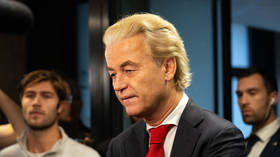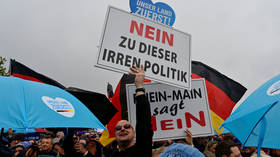
Geert Wilders had initially proposed targeting Islamic places of worship and holy books in 2018

© Getty Images / Carl Court
Dutch leader Geert Wilders has abandoned three controversial anti-Islamic legislative proposals that critics have deemed unconstitutional, as his Party for Freedom (PVV) continued negotiations to form a governing coalition, the PVV announced in a statement on Monday.
One of the contentious bills, initially proposed in 2018, sought to ban “Islamic expressions,” denouncing the religion as a “violent, totalitarian ideology.” Specifically, it would have prohibited mosques, the Quran, Islamic schools, and the wearing of veils, including burqas and niqabs.
The Council of State, a legislative watchdog, condemned the bill in 2019, declaring that it was “not compatible with the core elements of the democratic constitutional state, elements that the initiators intend to protect” and advising Wilders to discard it.

Read more
Wilders, whose party defied expectations by winning a parliamentary plurality in November’s elections, did not directly comment on the withdrawal of the legislation on Monday. However, he did suggest last year during a parliamentary debate following his ballot-box victory that his infamously anti-Islamic stance was not inflexible.
“Sometimes I will have to withdraw proposals and I will do that,” the politician said, promising to “show the Netherlands, the legislature, [New Social Contract leader Pieter] Omtzigt’s party — anybody who wants to hear it – that we will adapt our rules to the constitution and bring our proposals in line with it.”
Wilders made several similar comments ahead of and after the election, promising to put his anti-Muslim policies “in the refrigerator” to broaden his appeal, vowing to become a leader for all Dutch people “regardless of what you believe or what your background is.”
Omtzigt, who ran on a center-right reformist platform, has previously voiced concern that Wilders’ anti-Islamic crusade could violate the Dutch Constitution. However, his New Social Contract party has not ruled out participating in a governing coalition with the PVV, which won 37 of the 150 seats in the lower house of parliament in November and must partner with rivals controlling another 39 seats in order to assemble a guaranteed majority.
Wilders was set to resume negotiations with Omtzigt as well as the leaders of former PM Mark Rutte’s People’s Party for Freedom and Democracy (VVD) and the Farmer Citizen Movement (BBB) on Tuesday. Of the 15 parties that won seats last year, only the BBB, which secured just seven places, was immediately open to a partnership with the PVV.
Wilders’ party campaigned on an immigration crackdown, a binding referendum on leaving the EU, and prioritizing the Netherlands’ own national defense over military support for Ukraine. Its victory was decried by the media establishment and pro-EU elements in Amsterdam as a “Trump moment” and a harbinger of rising far-right extremism.




